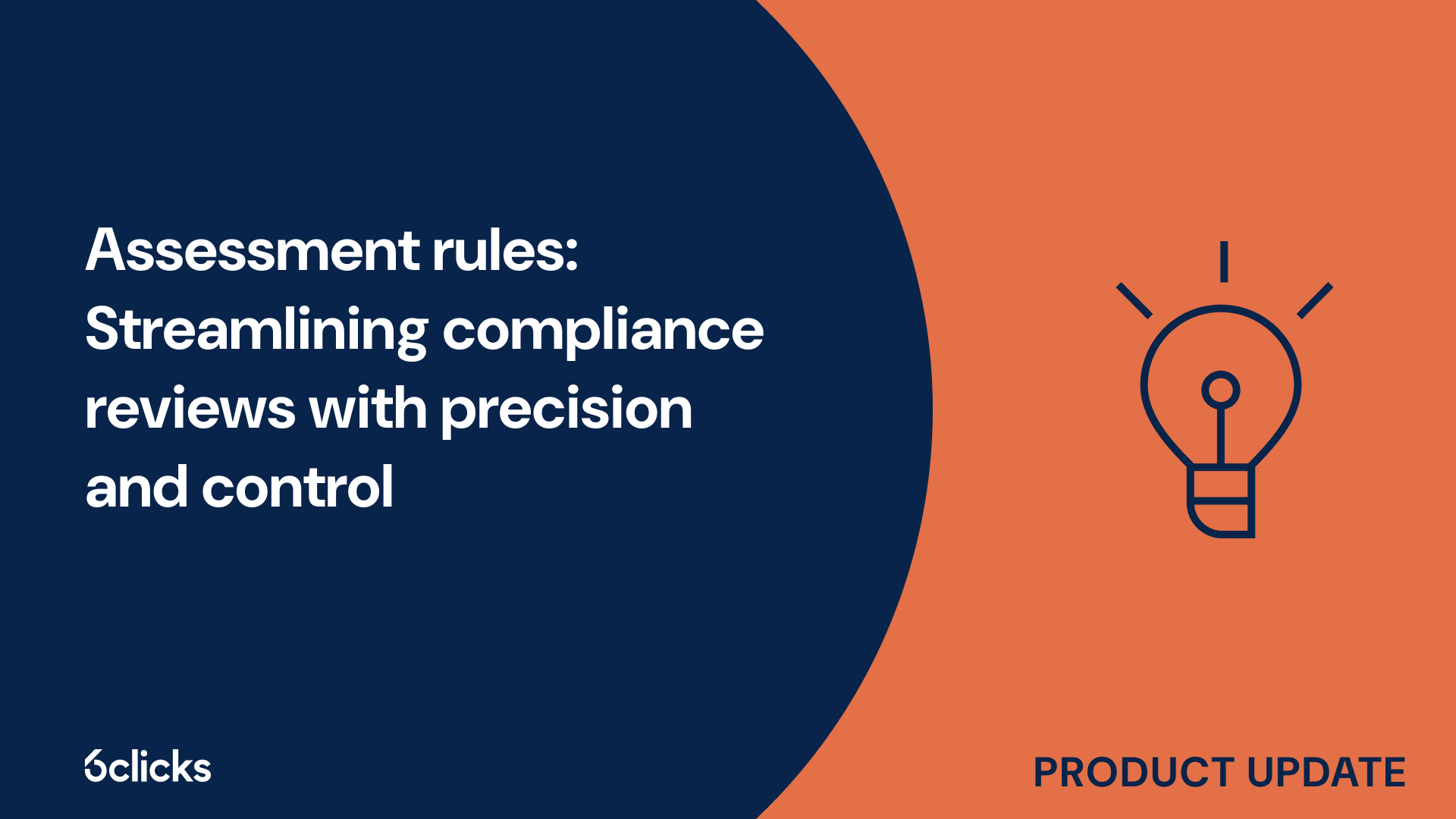The GRC buyer’s guide for 2025: Building resilience with AI-powered, federated solutions
Discover the ultimate GRC buyer's guide for 2025! Uncover how AI-powered, federated solutions transform compliance and security management for industries like government, aerospace, banking, and more. Learn about centralized control, continuous compliance, and advanced cyber GRC capabilities. Download now!
-1.png?width=200&height=249&name=Group%20193%20(1)-1.png)
The GRC buyer’s guide for 2025: Building resilience with AI-powered, federated solutions
Overview of ASIC
ASIC (Australian Securities and Investments Commission) is Australia's financial services regulator, established under the ASIC Act 2001. Its main role is to enforce laws that ensure fair, transparent markets, protect consumers, and maintain the integrity of the financial system. ASIC oversees a wide range of financial entities, including banks, insurance companies, brokers, and market operators. It ensures these institutions meet legal obligations and that financial products are marketed and sold responsibly. ASIC also educates consumers, addresses concerns, and can impose fines or sanctions to enforce compliance. Through these efforts, ASIC helps build trust and protect Australian consumers.
Retail investors and informed participation
ASIC is dedicated to ensuring retail investors can make informed decisions in the financial markets. It provides the necessary resources and protections to help investors understand risks and benefits.
- Access to information: ASIC requires companies to disclose accurate and timely information to help investors make informed choices. The MoneySmart website also offers free, independent guidance.
- Education and awareness: ASIC provides seminars, guides, and online resources to help investors understand financial products. It also works with consumer groups to protect investors' interests.
- Enforcement actions: ASIC investigates and takes legal action against fraud or misleading practices that harm retail investors, ensuring market integrity.
Types of regulation
ASIC plays a key role in overseeing Australia’s financial markets to ensure fairness, transparency, and consumer protection. It regulates financial products, services, and market operators to maintain market integrity.
Consumer credit regulation: ASIC enforces the National Consumer Credit Protection Act (NCCP Act) to ensure responsible lending and consumer protection. It supervises licensed credit providers and takes enforcement actions against non-compliant businesses.
Financial services regulation: ASIC oversees various financial service providers, including:
- Superannuation funds: Ensuring retirement savings are managed fairly.
- Managed funds: Overseeing pooled investment funds.
- Shares and securities: Regulating companies that issue shares and securities.
- Derivatives: Monitoring the trading of financial instruments like options and futures.
- Insurance: Ensuring insurers meet their obligations to policyholders.
Legal obligations and requirements: ASIC ensures financial market operators, such as the ASX, comply with listing rules and legal obligations. It also advises the government on the regulation of clearing and settlement facilities, which are critical for market stability.
ASIC’s role in enforcing legal requirements and providing oversight ensures that financial markets operate fairly, transparently, and efficiently.
Financial services industry
The financial services industry includes a broad range of businesses, such as banks, credit unions, insurance companies, investment firms, wealth management companies, and mortgage brokers. These organizations play a crucial role in the economy by facilitating transactions, managing risk, providing capital, and safeguarding assets.
Products and services:
- Basic services: Savings accounts, checking accounts, loans
- More complex offerings: Investment products, insurance policies, retirement planning services
- Additional services: Advisory services, brokerage services, and trading in stocks, bonds, commodities, and foreign currencies
To ensure fair and efficient operations, regulatory bodies like ASIC require businesses to obtain licenses. This licensing process involves a detailed assessment of a company's financial stability, risk management practices, and governance. Once licensed, financial services businesses undergo ongoing monitoring by ASIC to ensure compliance and maintain market integrity.
ASIC's oversight aims to protect consumers, foster market transparency, and encourage informed participation from retail investors. By enforcing regulatory responsibilities, ASIC helps maintain the stability and trust in the financial system, ultimately safeguarding consumer interests.
Market integrity providers
Market integrity is essential in the financial services industry, and ASIC ensures markets are fair, transparent, and orderly. ASIC oversees providers in equity, derivatives, and futures markets.
- Equity markets: ASIC enforces compliance and ensures systems are in place to prevent manipulation and fraud.
- Derivatives markets: ASIC monitors to ensure fair pricing, accurate information, and investor protection.
- Futures markets: ASIC ensures market operators follow rules and maintain transparency.
ASIC conducts audits and investigations to enforce compliance. Non-compliance may lead to fines, suspensions, or criminal charges.
Financial Market Infrastructures (FMIs)
FMIs are essential for the smooth operation of financial markets, ensuring the safe and efficient transfer of financial assets. They are responsible for clearing, settling, and recording financial transactions, which are critical to maintaining market integrity and stability. The Australian Securities and Investments Commission (ASIC) and the Reserve Bank of Australia (RBA) are the primary regulators overseeing FMIs in Australia. These regulators ensure that FMIs operate transparently and safely, mitigating systemic risks and fostering investor confidence.
Key roles of FMIs:
- Payment systems: Facilitate fund transfers.
- Central securities depositories: Provide secure platforms for settling securities transactions.
- Central counterparties: Act as intermediaries in derivatives transactions, mitigating counterparty risks.
- Trade repositories: Collect and store transaction data to enhance transparency and regulatory oversight.
Regulatory oversight:
- ASIC and the RBA regulate FMIs to ensure stability and transparency in the financial system.
- FMIs operate under the CPMI-IOSCO Principles, which focus on risk management, governance, and transparency.
- International standards, such as the EU’s MiFID, have influenced Australia's regulatory framework for FMIs.
These infrastructures are vital to the functioning of financial markets, and the regulations governing them are designed to ensure their integrity and to protect investors. Through stringent oversight and adherence to global best practices, FMIs help to maintain the confidence and stability of the financial system.
Futures contract markets
Futures markets allow traders to buy or sell contracts at a set price for future delivery. ASIC regulates these markets to ensure fair and transparent trading.
- ASIC enforces trading rules, monitors participants, and ensures market operators follow legal obligations.
- Traders must maintain systems for compliance, including accurate disclosures, fair pricing, and risk management.
- ASIC conducts audits and takes action against non-compliance.
An exemption allows ASX Clear (Futures) Pty Limited to provide certain clearing services without being a registered DCO, but ASIC ensures this doesn't impact market integrity.
Regulated industries in Australia
Australia’s regulated industries include finance, telecommunications, healthcare, and more. Regulatory bodies like ASIC oversee these sectors to ensure consumer protection, fair competition, and market stability.
Banking and Credit Unions
ASIC regulates banks and credit unions to ensure they operate fairly and responsibly. It enforces laws like the Corporations Act and the National Consumer Credit Protection Act to protect consumers. ASIC monitors licensing, oversees financial products, and takes enforcement actions when necessary.
The regulatory environment in Australia
The Australian Securities and Investments Commission (ASIC) oversees Australia's financial services industry to ensure market integrity and stability. ASIC enforces regulations and works alongside other bodies like the Council of Financial Regulators (CFR) to maintain financial system stability.
- ASIC's Role: Enforces financial regulations, ensures consumer protection, and promotes market transparency.
- CFR: Includes ASIC, the Reserve Bank of Australia (RBA), and the Australian Prudential Regulation Authority (APRA) to enhance financial system stability.
Summary
The Australian Securities and Investments Commission (ASIC) is the key regulator of Australia's financial markets, ensuring fairness, transparency, and consumer protection. ASIC oversees a range of financial entities, including banks, insurance companies, and brokers, ensuring they meet legal obligations. It regulates financial products and services, such as consumer credit, superannuation, managed funds, and derivatives, to safeguard consumer interests and promote market integrity.
ASIC also ensures that financial market infrastructures (FMIs) operate smoothly and securely. It supports retail investors by providing access to accurate information and resources to make informed decisions. Through its comprehensive regulatory role, ASIC maintains trust in the financial system and protects Australian consumers.
6clicks' solution
- Unlimited access to regulatory frameworks such as the Prudential Standard CPS 230, which mandates operational resilience measures for Australian financial institutions
- Customizable registers for tailoring workflows and managing diverse risk and compliance information according to distinct requirements
- Integrated risk management, incident management, and control management capabilities for robust protection against cyber threats and disruptions







.jpg?width=302&height=170&name=eBook%20Title%20-%20Risk%20management%20for%20ISO%2027001%20and%20ISMS%20expert%20guide%20eBook%20(1).jpg)





